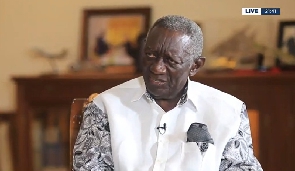General News of Thursday, 11 February 2021
Source: happyghana.com
Coronavirus: ‘Zero risk of infection not a guarantee’ - Dr. Okoe-Boye
Deputy Minister of Health in President Akufo-Addo’s first term, Dr. Bernard Okoe-Boye has posited there is no way anyone can be assured of a zero risk of infection from the COVID-19 pandemic.
He noted that one can only reduce his or her chances of contracting the virus but can never remove the possibility of ever contracting it.
Advising Ghanaians on measures to reduce the possibility of contracting the virus, he said, “It is not about zero risk of infection but about risk reduction. Engage in risk reduction behaviours”.
Reacting to calls for the re-closure of schools as Ghana’s COVID-19 case count keeps increasing, he admitted that schools are not zero risk areas but regarded them as safe.
Speaking on Y 107.9 FM’s Leaderboard Series with Rev Erskine, Dr. Okoe-Boye said, “One cannot guarantee zero risk of infection in schools. Not being in enclosed areas helps a lot and many people say we should close down schools but if this is done, the malls will be opened and the kids will get the virus”.
The politician added that schools were open areas where all COVID-19 safety protocols were adhered to the latter and said, “that is safe and we are reducing risk behaviours”.
Driving home his point of a non-existent situation of zero percent rate of infection, he added, “Even in the Intensive Care Units (ICUs) where doctors are covered with PPEs from their heads to toes, we still record positive cases. We should rather engage in behaviours to reduce our chances of contracting the virus. You wear your masks and you’re good to go”.
Dispelling the notion that the virus does not exist in tropical areas, Dr. Okoe-Boye noted that there is a bit of science to the assertion but it is entirely false for one to believe the virus cannot survive in such conditions.
“Classically, viruses don’t die, but the chance of them being active in cold regions is very high and the notion that heat kills the virus has a bit of science in there. Heat does not entirely kill the virus. Hot environments don’t keep the virus at bay but make it difficult for it to move from one person to the other directly”.
Citing a typical scenario of transmitting the virus in a tropical area, he stated, “Shaking hands with an infected person who has sneezed into his palms is a sure way of transmitting the virus, especially after rubbing your face with the same hands. Even if you do this under the blazing sun, you will still contract the virus”.
He advised Ghanaians to avoid very cold and enclosed areas as they are the biggest drivers for the spread of COVID-19. “If you are in an open environment, the risk of infection is significantly reduced”, he said.













